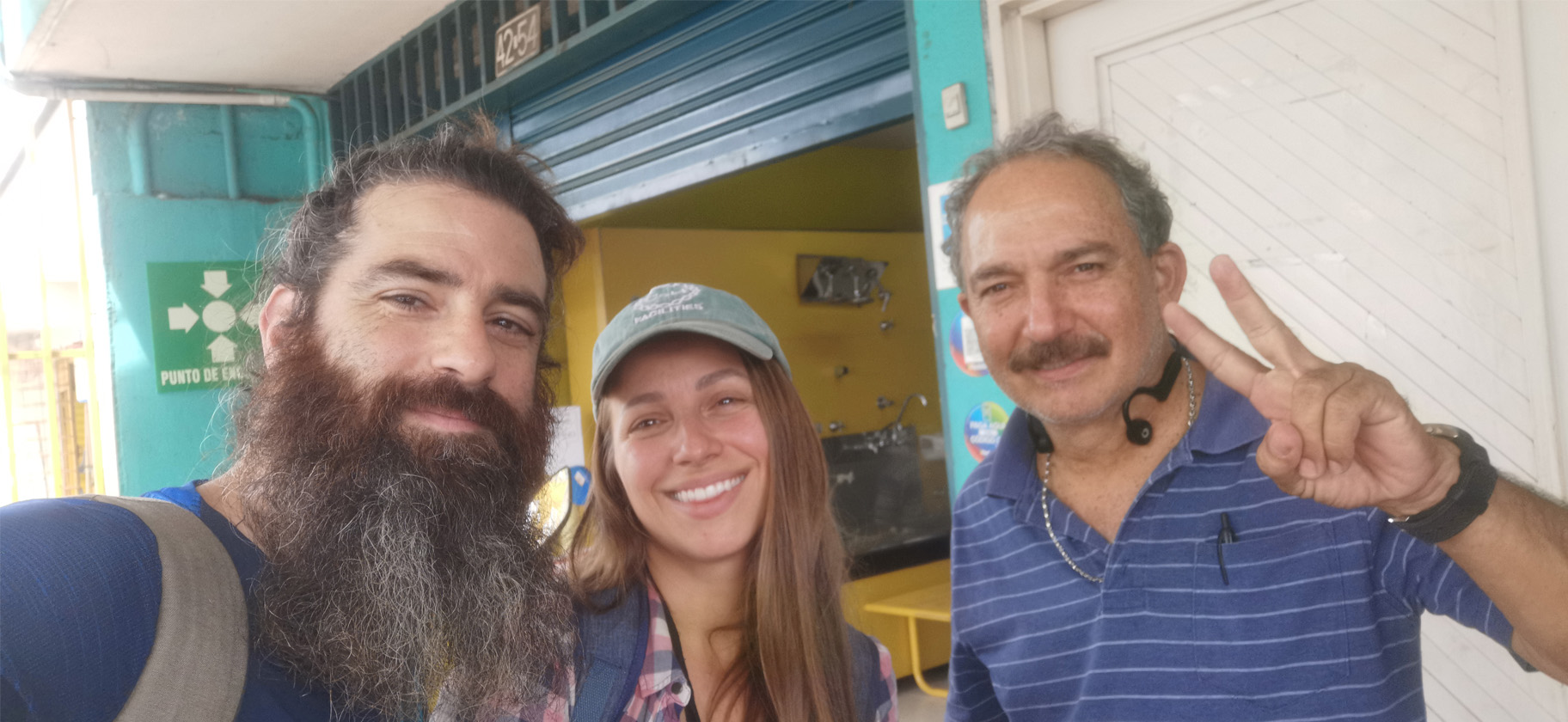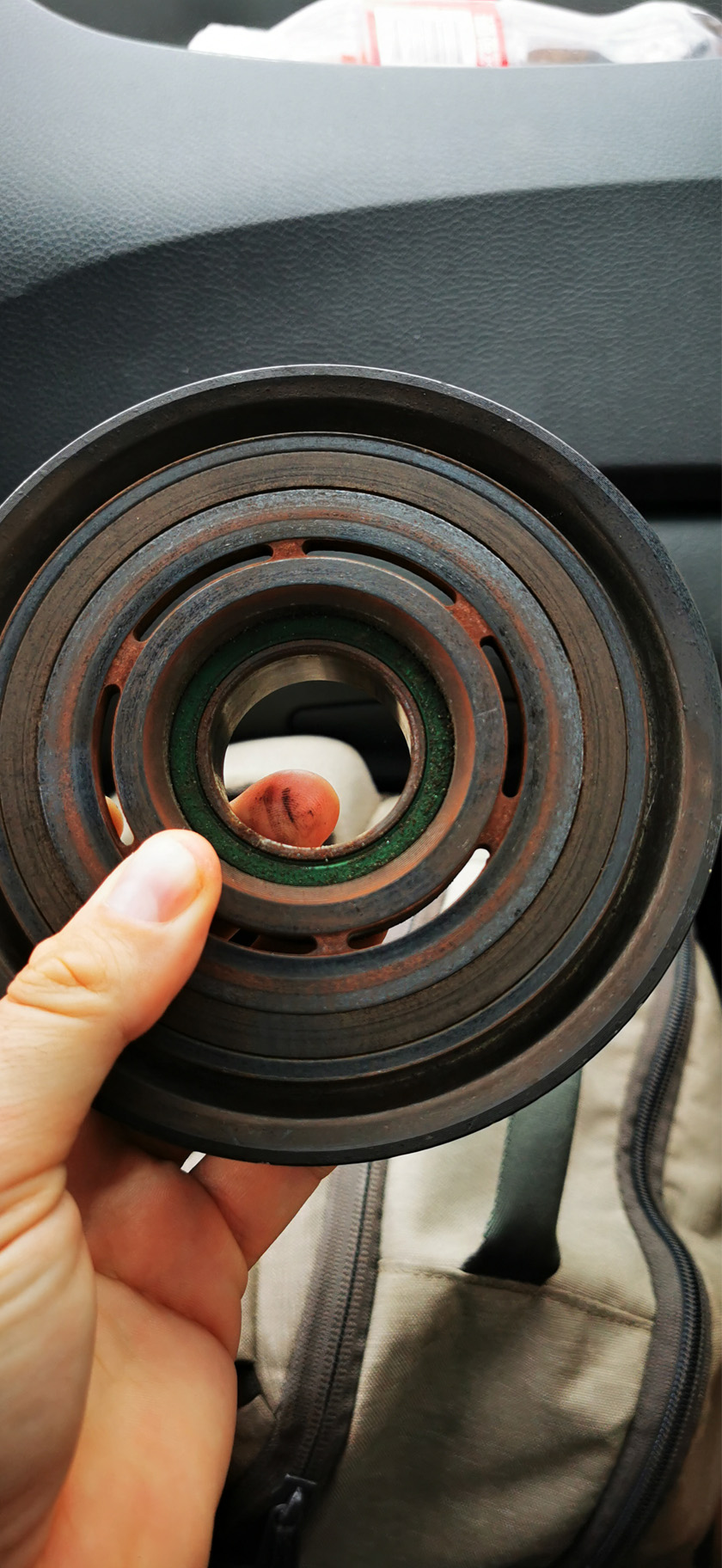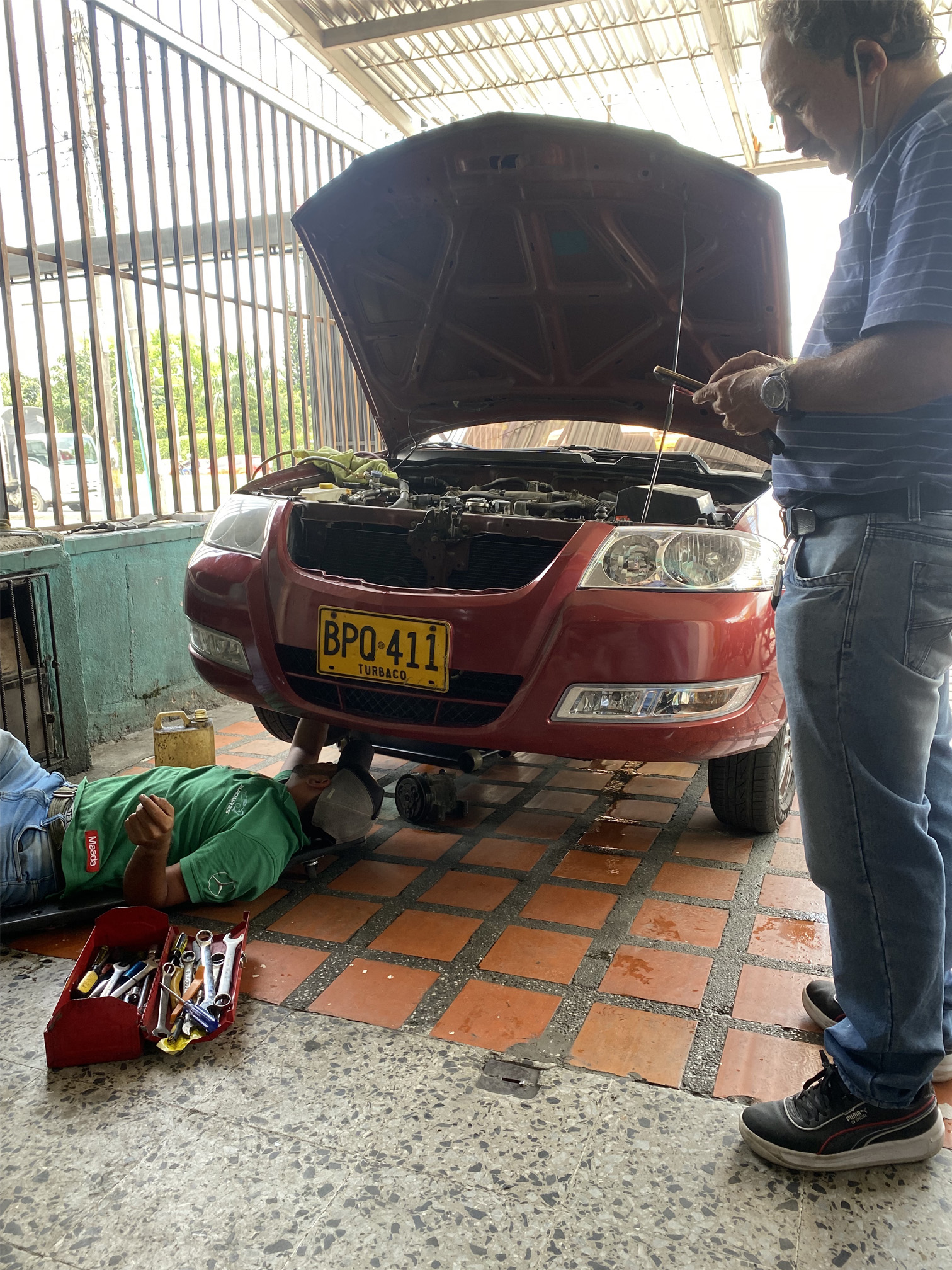Cali George

There is a law of the universe whereby the right person always finds you when you need them.
The drive to Cali had been one of the smoothest, courtesy of one of Colombia’s rare flat two-lane highways, but Tranquilo’s engine was making strange noises the entire way. In vain, we had pulled off the highway a few times hoping to find a mechanic but, it being Good Friday and most everything being closed for the long weekend, we decided to keep driving and hope for the best.
My three-month entry was on the verge of expiring. We had been held up so many times and movement from town to town was so slow that it was becoming imperative that we make meaningful progress and Cali did not possess enough charm to keep us beyond the weekend. I had found a mechanic in town who explained that one of the bearings – un rodamiento – was likely responsible for the noises that Tranquilo was making and would need to be replaced, but he could only start repairing it on Monday and said that it could take a couple of days.
Cali George was meandering through the hotel lounge casually chomping away on sunflower seeds as we perused the breakfast menu – by now we were sick to death of arepa and eggs – and discussed what we should do about the car. Cali was the last major city with every service available until Quito which was still more than 700 kilometres away, but how to get the work done quickly so that we could get on our way was going to be difficult because our timing was poor.
He must have been eavesdropping.
You have a problem with your car? Cali George asked swaying over toward our booth.
We are looking for a mechanic, I replied. Normally, I would have been put off by his brazen interruption but I was short on options and I had only been in Cali for one sleepless night. Do you know any mechanics that are open on Easter Sunday?
Sure, I know a couple. How long are you in town?
We aim to be in Popayan by Monday.
Listen, I have to take some people out to see a waterfall this morning, but I will be back in the afternoon. Give me your number and I will take you to someone who can help you with your problem.
Cali George was in his mid-fifties and worked as a local tour guide. Curly-haired and moustachioed, he had a BlueTooth headset dangling from his ear at all times and even while he spoke to us he looked down at his phone as though his attention was in 10 different places.
We drove with George out to a shop on the south side of town where the official diagnosis came in that the problem was with not just one of the bearings that controlled the compressor of the air conditioning unit. We had become accustomed to driving through Colombia in the hottest part of the day and had been running the air conditioning non-stop just to survive, so it did not come as a huge surprise that of all the parts that would fail it would be the air conditioning. With all of the work that had already been done to keep us moving, because we could still drive without using the air conditioner, this situation became a test of how I treated problems with the car. I tried to see months ahead and envision the moment when it was time to sell Tranquilo. Would I drive her to the ground and eventually declare her a total loss? Would I explain to a purchaser that the car could run but that it had a host of problems and parts that needed to be changed and simply accept whatever I could get? After the incident with the fuel pump, I had come to terms with both of these scenarios but there was still a side of me that saw myself explaining to a purchaser all of the parts on the car that were like new and me potentially making a small profit from the sale. The weather was still routinely climbing into the 30s, so getting the air conditioning fixed once and for all felt like the right thing to do in the long-term and the near-term.
Can he fix it right away? I asked.
No, he can’t fix it. George replied. We will need to take it to a shop that works exclusively with air conditioning units. But they would be closed by now. You will have to wait until tomorrow.
Maybe I should just delay our trip to Popayan.
No, don’t do that. Popayan is much nicer than Cali.
But it’s almost 4 hours to drive. If we can’t even start work on the air conditioner until tomorrow we won’t arrive in Popayan until very late at night. I prefer not to drive at night time and, if it’s easier for me to just stay an extra night, it’s not a big deal.
Trust me, George said looking me directly in the eye for the first time, we will be able to get the air conditioner fixed and get you to Popayan. I have a short tour in the morning but I will text you the location of the shop that can fix the air conditioning.
Jenia and I retreated to our hotel and got lost in our work. So many thoughts swirled in my mind, but work has had a steadying influence on my life since I became a nomad. The car itself had been an expense outside of my budget, but now the costs of maintaining her were adding up. How much could an air conditioning repair possibly cost? This concern is eased by knowing that when I open up my computer to work on a project, I am defraying that cost. What more obstacles might we encounter on the road ahead? As long as I have work and money coming in, then I can pay for a safe place for us to stay so that I can do more work. It is a comforting cycle that eases anxieties. How trustworthy was Cali George – this stranger who dropped suddenly and unexpectedly into our lives? It is my work that puts money into my accounts and into my savings and there was a cap on how much a swindler could cheat us – I have reserves. Would we make it to Popayan? Happy clients and completed projects mean that money regularly gets siphoned into my accounts. With adequate funds, getting to Popayan, regardless of the state of the car, was not a matter of if, but when.
We were packed and checked out and ready to take on the day when George sent us the location of the air conditioning repair shop. We plugged the location into the GPS and headed out. When we arrived at our destination, there was no repair shop. I texted George and explained the situation. Wait for me, he texted back.
Within 20 minutes, George arrived right where we were parked. Poking his head out of the window of his car he said, Follow me!
We sped blindly onto the highway and through Cali’s inner-city closely following George’s car until we came upon a line of shops by the roadside that specialized in automobile air conditioner repair. George got out of his car and walked over to where we were parked. Don’t get out of the car and don’t say anything, he said. After a few minutes at one shop, he came back over to our window and said, This guy I don’t know so well and he’s asking 550,000 pesos. This guy at the other shop is a friend and will be able to do it for about 300,000.
Diego worked out of a small garage and, flashing braces from his toothy grin, could only have been about 21 years old. He promised to do the whole job for 300,000 pesos and would get us back on the road by 2 pm. Diego disassembled the air conditioning unit, removed the bearing, and spun it on his finger to reveal the clickity-clack of the faulty piece which should spin smoothly and silently.
 We headed out in George’s car to another part of town that was an entire avenue with auto parts shops lined up on either side. Our first stop was at a foundry where they could separate the two cylinders of the bearing for about five dollars. From there we hopped across the street where they sold the inner cylinder that needed to be replaced.
We headed out in George’s car to another part of town that was an entire avenue with auto parts shops lined up on either side. Our first stop was at a foundry where they could separate the two cylinders of the bearing for about five dollars. From there we hopped across the street where they sold the inner cylinder that needed to be replaced.
Don’t buy Chinese, was George’s advice. It’s better to pay more and buy German or Japanese because you know you are buying quality. If not, you will be right back here in a week.
The shop was out of stock of the part we needed so an employee hopped on his motorcycle and headed across town to track it down from another shop. Twenty minutes later he returned with the part which we paid for and then walked back across the street to the foundry where they reassembled the bearing with the new part. When they were done I spun the new bearing on the end of my finger and it was able to spin smoothly.
We hopped back into George’s car and made our way back to the air conditioner repair shop while travelling through one of Cali’s less savoury neighbourhoods.
I’m a tour guide, he said. If I could have avoided it, I would never have taken you through this area of town, but we have to hurry a little bit.
It was your typical struggling inner-city neighbourhood with abandoned brick buildings, graffiti, and strewn garbage. The economy was mostly small kiosks of fruits and vegetables and other sundries under parasols. The most desperate huddled under sheets of tarpaulin for shade from the midday sun. From my point of view, it did not look much different from East Hastings Street in Vancouver or Skid Row in LA. But for us, even having travelled through big cities like Cartagena, Bogota and Medellin, this kind of desperate poverty was a sight not yet seen in Colombia.
This area used to be even worse, George continued. I don’t like it, but at least I can drive through it now. Years ago, you just never knew what could happen. People would just be driving along and some crazy guy might come up to your window and just empty the clip of his gun. You just never knew.
Every so often, while interacting with locals, we were given this reminder that every Colombian has touched violence. Like Medellin, Cali was once under the control of a cartel. It was the Cali cartel, under the leadership of the Rodriguez Orejuela brothers, that was the chief rival to Pablo Escobar’s Medellin cartel. It was they who formed Los Pepes, the vigilante paramilitary group that eventually took down Escobar and subsequently helped the Cali cartel to take control of as much as 80% of the world’s cocaine market in the 1990s.
In his mid-teens, George spent months in the jungle harvesting coca leaves and processing them into the paste that would eventually become bricks of refined cocaine powder. At that time, harvesting coca was just a job. The job paid, but it was those experiences that imbued him with a love of nature and led to his career as a tour guide and an amateur naturalist. But before starting a new life free from the cartels, George first had to get out. He took a trip to the United States where he was a walk-on and earned a scholarship to play soccer for Howard University in Washington D.C. He learned English, got a business degree, and lived for a while in the United States before returning to Colombia and starting a family. Grown-up and educated, he could now choose from a wider array of job opportunities, but even in returning home to Colombia in the late nineties, violence still was not far away.
Thirty years later and the cartels have been pushed into Colombia’s hinterlands and are no longer a persistent menace. Peace is returning to Colombia and order is being restored to its majestic national parks – their real beauty is visible again. George recounted with delight what it was like to track through the forests and how to avoid being mauled by jaguars. Feline predators were beholden to an order of nature and connected with the forces that flow through those forests. For someone with as much experience traversing their lands as George, it made their brand of danger predictable. The terror of the cartels was the very definition of unnatural. They existed beyond logic, order, and reason – their only pursuits were murder and chaos – and their brutality blighted the whole country.
 We returned to Diego’s shop with the refitted bearing and he got to work overhauling the air conditioning system. George stuck around for a while to make sure that everything was moving along smoothly but the morning was now long gone and he had tours to run in the afternoon. You should be okay, George said before he left. The next time you fill up you should also buy some octane booster – you’ll be able to drive further on one tank of gas. He was stalling. He knew he had to leave – business is business – but he was hesitant to do so with the job still incomplete. Popayan is a nice town, so have fun. It’s three, maybe four hours. You’ll be on the road by 2. You’ll be okay. I urged him along with a confident nod of my head and shook his hand while slipping him 50,000 pesos for his trouble. It was undeclared payment under the table – the only kind of payment the cartels had ever understood – but it was in exchange for helping someone who needed it and that is the most honest way to make a living.
We returned to Diego’s shop with the refitted bearing and he got to work overhauling the air conditioning system. George stuck around for a while to make sure that everything was moving along smoothly but the morning was now long gone and he had tours to run in the afternoon. You should be okay, George said before he left. The next time you fill up you should also buy some octane booster – you’ll be able to drive further on one tank of gas. He was stalling. He knew he had to leave – business is business – but he was hesitant to do so with the job still incomplete. Popayan is a nice town, so have fun. It’s three, maybe four hours. You’ll be on the road by 2. You’ll be okay. I urged him along with a confident nod of my head and shook his hand while slipping him 50,000 pesos for his trouble. It was undeclared payment under the table – the only kind of payment the cartels had ever understood – but it was in exchange for helping someone who needed it and that is the most honest way to make a living.